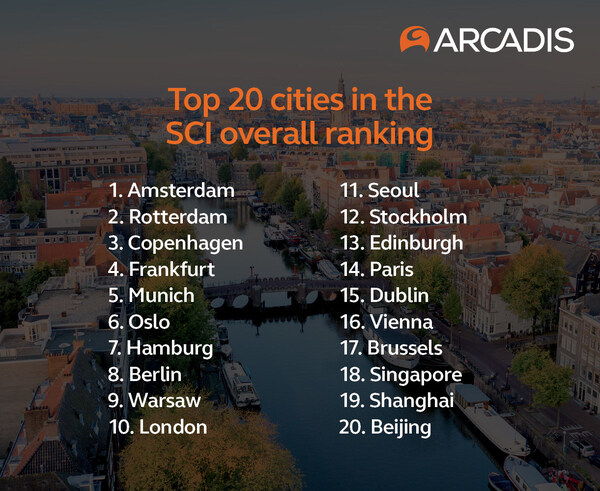 |
- Arcadis' Sustainable Cities Index 2024 reveals major disparities in sustainability progress, as cities race to meet 2030 Sustainable Development Goals (SDGs)
- Amsterdam takes top spot as most Sustainable City, thanks to strong economic performance, social equity, and renewable energy investment.
- Maintaining trajectory critical as SDG deadline approaches, with opportunities for even highest-ranking cities to accelerate sustainability goals
AMSTERDAM, June 12, 2024 /PRNewswire/ -- Arcadis has issued a rallying call to cities worldwide, as the publication of its Sustainable Cities Index 2024 reveals the need for accelerated action in tackling climate change and other sustainability challenges.
The publication of the report comes with nearly 2,000 days until the 2030 deadline for achieving the UN SDGs. It reveals clear differences between leading cities such as Amsterdam (1st), Copenhagen (3rd) and Munich (5th), and those trailing behind - particularly US and Asian cities like New York (48th), Boston (56th), and Taipei (62nd).
Arcadis' Sustainable Cities Index ranks 100 cities across three pillars of sustainability - Planet, People, and Profit. Marking the 6th edition of the report since its inception in 2015, it comprises 67 metrics that highlight our evolving understanding of sustainability, including air pollution, waste management, and investment in low carbon infrastructure (including renewable energy and sustainable transport), as well as economic performance, social equity, and natural disaster resilience.
This year Arcadis has also added a fourth 'Progress' pillar to measure change over time. This demonstrates the impact of sustainability interventions over the last decade and, when considered alongside the other pillars, provides insights into a city's future trajectory.
Overall, European cities dominate the top of the Index. All four German cities included in the report – Frankfurt, Munich, Hamburg, and Berlin – claim spots in the top 10, buoyed by achievements in water sanitation and waste management, and low greenhouse gas emissions.
High performance in the Planet pillar is associated with overall success, with eight of the top 10 cities for Planet also appearing in the overall top 10. The Planet pillar is comprised of metrics like sustainable energy systems and low-emission transport, suggesting these are powerful tools for urban sustainability.
This year's index also highlights that high performance on the Profit metric does not necessarily come at the expense of environmental sustainability. The report emphasizes how a thriving economy should support investment in infrastructure, alternative energy sources, green initiatives, and social programs. Amsterdam, the most sustainable city of 2024, also ranks at the top of the Profit pillar, excelling in income and living standards, employment, and transport infrastructure.
North American cities dominate the Profit pillar. San Francisco, Dallas, Chicago, Houston, New York, and Seattle all appear in the top 10 for Profit, thanks to ease of doing business, GDP per capita, and employment rates. However, while these cities demonstrate business success, wage levels and living standards are not keeping pace. To move higher up, socially inclusive development strategies are critical, and North American and European cities must draw inspiration from each other to continue making progress.
When it comes to progress over the last decade, many European cities have made significant strides – despite their sustainable starting points – to cement their position at the top of the Index. Amsterdam, Rotterdam, Warsaw, Copenhagen, Frankfurt, Munich, Hamburg, and Berlin all feature in the top third of the Progress pillar and the top third of the index overall. This is thanks to a commitment to renewable energy production, as well as socio-economic factors like female labor force participation, and healthcare.
Although low in the overall rankings, the dominance of Asian cities such as Jakarta, Wuhan, and Shanghai at the top of the Progress pillar shows that, in cities with limited prior sustainable infrastructure or practices, early steps can have enormous impact in generating momentum.
John Batten, Arcadis Global Cities Director, said:
"Cities play a critical role in advancing the sustainable development agenda. However, our progress assessment shows that more needs to be done to meet the SDG deadline. With just 2,000 days to go, the challenge is to keep innovating. Whether by scaling up renewable energy initiatives, integrating climate considerations into infrastructure planning, improving mobility through intelligent traffic management, or supporting the retrofit of existing buildings, there are always areas to improve. As 2030 approaches, cities must build on successes, identify areas for progress, and foster collaboration to address challenges."
Download the full report here.
source: Arcadis
【你點睇?】政府委任王冬勝明年起接任港大校委會主席,現任主席王沛詩不獲續任,五名年底任期屆滿的校委將全數換人,你對新任命是否滿意?► 立即投票
































